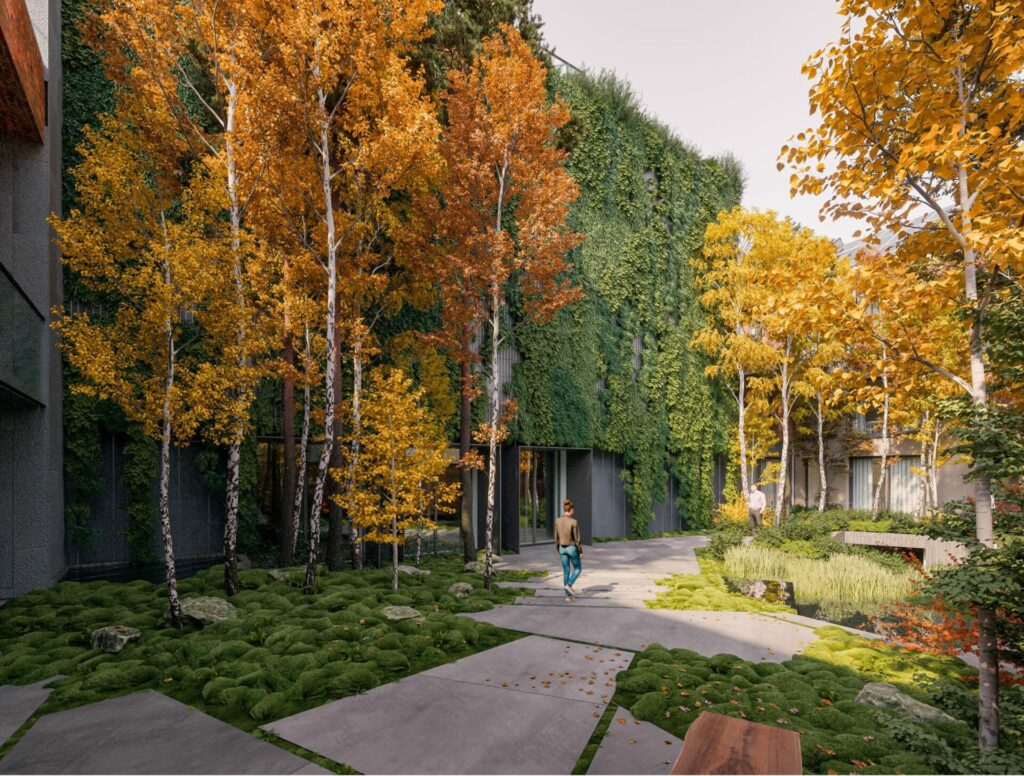The iconic but long-abandoned Elisabeth Hall – a pre-war cinema turned concert venue – in Brussels' Marolles neighbourhood will be given a new look, and become a sustainable, cultural and social urban oasis by 2027.
Once a renowned concert venue, the Elisabeth Hall on Rue Haute had to close its doors in the 1960s. Not long after, the property was handed over to Raymond Halconruy, who turned it into furniture shop Meublia for over 50 years. Since 2017, the building has been mainly empty.
But that will soon change: ambitious renovation works will transform the decrepit building complex into "a sustainable, net zero carbon, social and cultural urban oasis," Olivier Castus, project manager for Green Nest, told The Brussels Times.
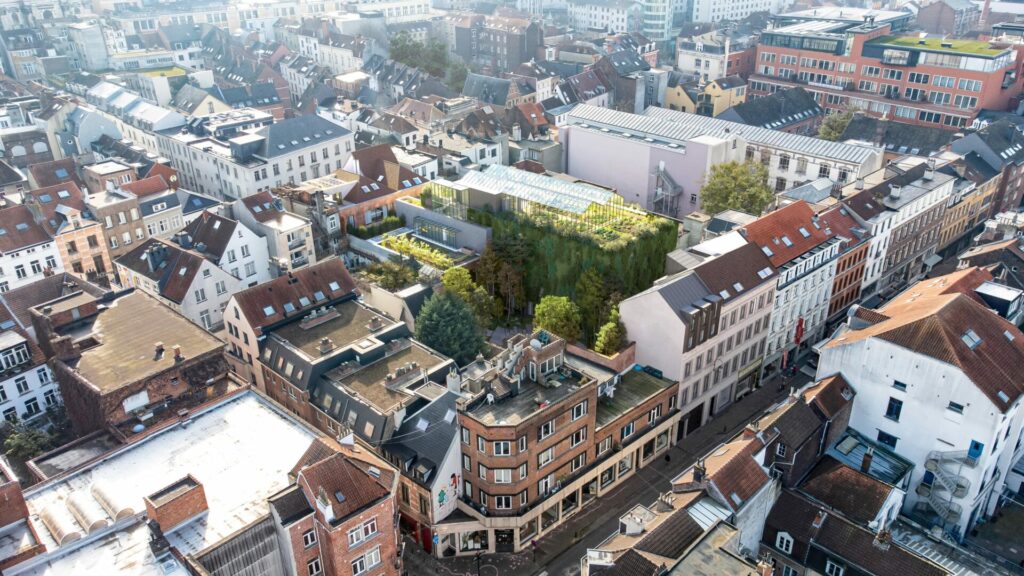
Synthesised aerial image showing the rooftop greenhouse. Credit: cm architectes associés / BOCO
The aim is for the hall, which has been disused for 60 years, to regain its original purpose as a classical concert venue, to be used for more modern concerts, lectures, or other forms of culture.
"The building's initial functions will be kept, but enhanced. Additional functions will focus on sustainable urban innovation contributing to address environmental challenges and necessary urban transition," Castus said, explaining that addressing environmental challenges will be an essential part of the renovation process. "There will be greenery all over the walls, a garden and a greenhouse on the roof."
Cities are largely contributing to environmental pressure, he stressed. "70% of the worldwide population will live in cities by 2050, and those cities are responsible for 70% of consumption-based, energy-related CO2 emissions today. Up to 85% of existing buildings in the EU will still be in use in 2050 and not even 1% of buildings are net zero today."
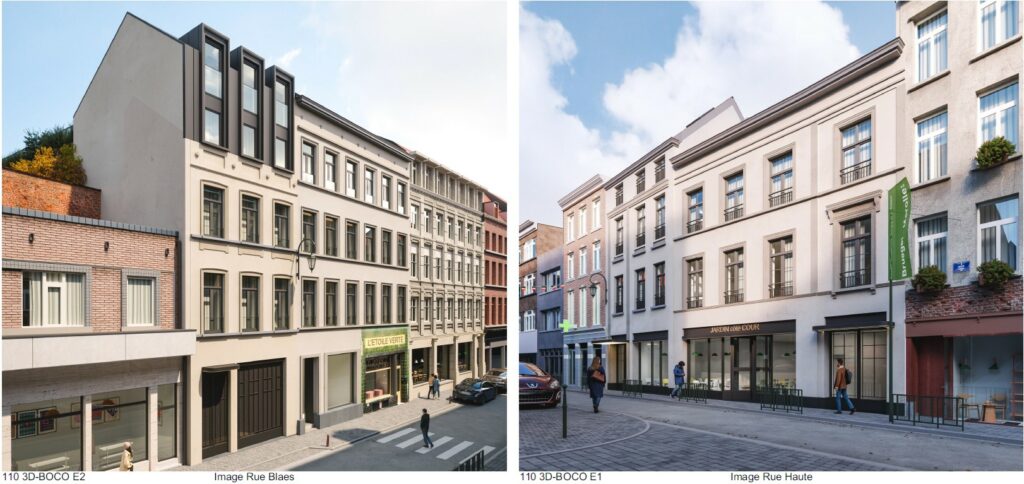
Credit: cm architectes associés / BOCO
The plan is not just to completely restore the concert hall, but also to give the entire block a boost thanks to a sustainable renovation and the use of nature. This will make the urban environment more resilient to intense heat episodes.
The first challenge is bringing the upper floor back up to par with the ground floor. At the time of the furniture shop Meublia, the owner divided the high concert hall into two areas to gain space – using the upper floor for storage and the ground floor for retail.
Additionally, as the indoor concert hall is listed as Brussels heritage, every lick of paint must also be carefully restored.
Companies specialising in acoustics and sound for concert halls were also consulted to modernise the space. They chose to design a polyvalent interior acoustic and create a soundproof 'box-in-box' system for the venue.
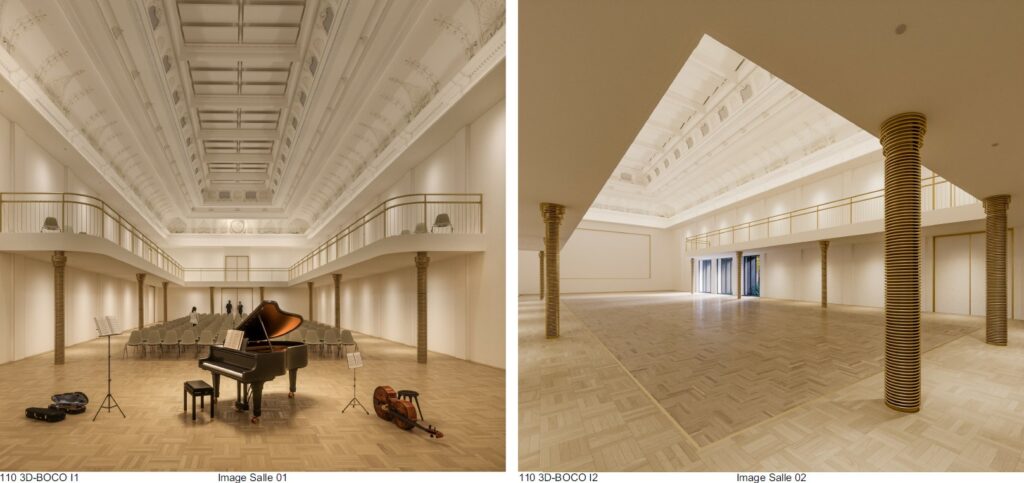
Credit: cm architectes associés / BOCO
In addition to restoring the concert hall, an accompanying restaurant with local products and a 'zero-waste' philosophy will be opened. There will also be a cocktail and lounge bar with Belgian drinks, a sustainable micro-town farm with a greenhouse, two sustainable commercial premises and nine flats.
"The idea is to renovate and use nature to make cities more comfortable and to address the increasing climate challenges in the future," explained Castus. "Cities need to change, because with climate change they will only be facing more hazards."
'Bringing the countryside to the city'
The sustainable greenhouse/micro-town farm on the roof of the building should provide local production of seasonal vegetables, herbs and fruits – from spearmint and aniseed to aubergines and rhubarb. This would then form the basis of the seasonal vegetable offering for the restaurant.
"The project will change the way we consume by favouring short circuits and healthy food," Castus explained. In total, the mini farm should provide 1,184 m² of green space and urban biodiversity on the roof and walls of the concert hall, which should eventually result in the harvesting of 1.45 tonnes of local vegetables, fruits and herbs per year.
"The idea of this micro-farm is not to produce vegetables en masse, but to raise awareness and adapt our way of consuming to eat more local and seasonal food," he added. "We are bringing the countryside to the city."
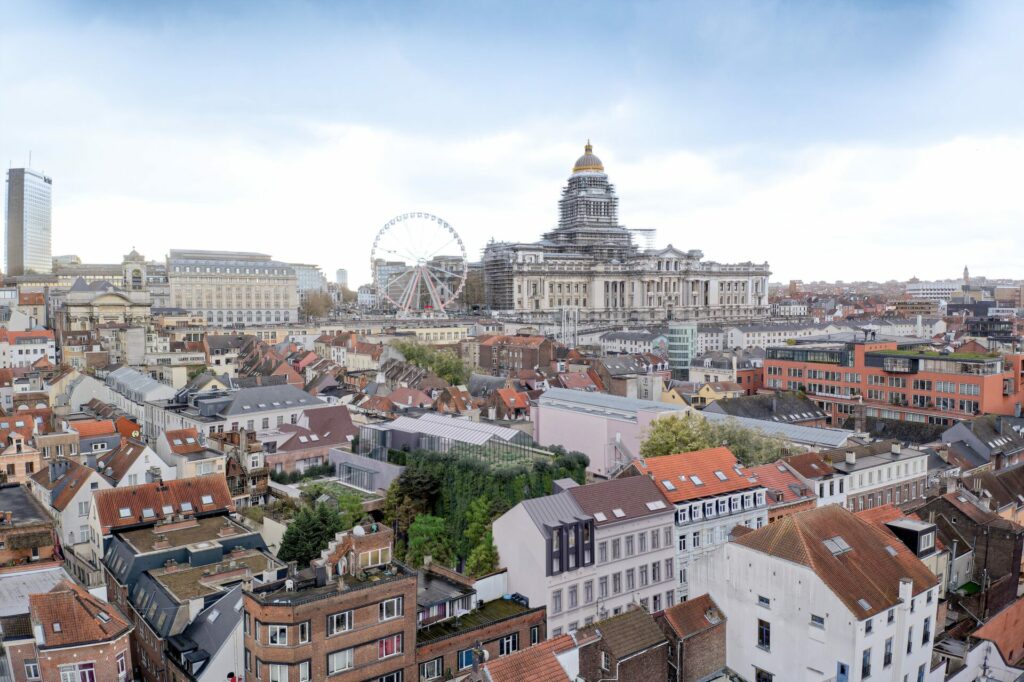
Synthesised aerial image showing the rooftop greenhouse. Credit: cm architectes associés / BOCO
The greenhouse will also be fitted with translucent solar panels and an indoor heat pump to maximise local and in-house energy generation for the entire building. This sustainable energy will be stored and shared with the other stakeholders and residents.
Additionally, Green Nest hopes to play a role in combating heat islands in the capital through "a drastic greening of the site," including an indoor garden. "The outer wall of the concert hall will be covered with vegetation, which will make the site stand out compared to other buildings in the area," Castus said.
The project is part of Green Nest's low-carbon and sustainable philosophy, contributing to making Brussels combative against climate change. "We need to change the way we live in cities, and we need to reduce our carbon footprint. While there is initiative to improve, there is still work to be done to become climate-neutral by 2050."
Related News
- 'Nature close to home': Brussels calls on residents to make the capital greener
- Major real estate projects in Brussels must provide 25% social housing
- Digging deeper: Most of Brussels' soil polluted and damaged
Béco 87 in Ixelles is another Green Nest urban micro-farm and the future "coworking" farm Les Collines de Babel (Walloon Brabant) is also part of the network.
The permit application to renovate the listed building received a unanimous favourable opinion from the administration, and the planning permit should be delivered in the coming months. The Elisabeth Halls project is one of the ten laureates of the European GROOF project call, of the EU Interreg programme.
The project is hoped to be completed by 2027-2028.

